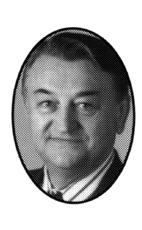Madam Speaker, it gives me great pleasure to rise today in support of Bill C-47, an act to amend the Department of External Affairs Act.
Our government made a commitment when we were sworn into office to change the name of the Department of External Affairs to the Department of Foreign Affairs and International Trade. This change in title is a recognition of the changes of the department's mandate that have occurred over the 85 years since its inception.
The Department of External Affairs was created in 1909 by Prime Minister Wilfrid Laurier to conduct Canada's foreign policy. Since then the mission of the department has adapted to reflect Canada's growing role on the international stage.
During World War I for example, Canada played an important role internationally as part of the allied forces and a member of the imperial war cabinet. By the end of the war, Canada was emerging as a fully independent nation. This maturation was reflected in changes to the fledgling department.
In the 1920s under the leadership of Dr. O. D. Skelton, the Under-Secretary of State for External Affairs, and Counsellor Loring Christie, the department began to evolve into its current structure and the Canadian diplomatic corps was formed.
The second world war contributed further to the growth of the department. Canada became an active world player. We were a founding member of the United Nations and a full participant in such other international organizations as the North Atlantic Treaty Organization, NATO; the General Agreement on Tariffs and Trade, GATT; the International Monetary Fund, the World Bank and, of course, the Commonwealth.
In more recent years, Canada has steadily increased its role in world affairs and joined additional organizations such as the G-7, the group of seven major industrialized nations, La Francophonie, and the Organization of American States, the OAS.
The department contributes significantly to this role, fulfilling its mission to portray, promote and defend the interests of Canada, to improve Canadians' awareness and understanding of the world and to serve Canadians at home and abroad.
Bill C-47 will amend the External Affairs Act to change the legal name of the department and the titles of its ministers and senior officials. Under this act, the Secretary of State for External Affairs becomes the Minister of Foreign Affairs. The title of the Minister for International Trade remains unchanged. The title of the junior minister, the Minister for External
Relations, will change to become the Minister for International Co-operation.
Senior official titles currently including the term under-secretary will reflect ministerial changes, thus the Under-Secretary of State for External Affairs will become the Deputy Minister for Foreign Affairs, referred to as the DM for foreign affairs.
Bill C-47 makes no substantive changes to the structure of the department. Rather the change in name affected by this legislation reflects the current mandate of the department.
I would like to add a few words about the roles of the two new positions not written into the act but important to the development of Canadian foreign policy. These are the positions of Secretary of State for Latin America and Africa, and I see the secretary of state listening very attentively to what I am saying, and of course the Secretary of State for Asia Pacific.
The secretaries of state have proven to be invaluable contributors to Canada's foreign policy. They travel and meet widely with leaders in many countries where Canadian foreign policy interests are being pursued. I know how active they are in liaising with the diplomatic corps here in Canada. They complement the work of the minister very effectively.
Let us not forget the role of the Parliamentary Secretary to the Minister of Foreign Affairs, a position also not incorporated in this act but a very important role to represent the Minister of Foreign Affairs in his absence when he is out representing Canada in his many, many duties. I know personally what a heavy role that minister plays. Therefore the roles of secretaries of state and parliamentary secretary are very helpful to the minister and to the department.
To conclude, I say that the object of the bill is very clear. It is simply to make sure that our presence abroad and in international organizations reflects today's reality.
In our history, we went from colony to dominion and finally independent nation. The new title of Department of Foreign Affairs and International Trade makes this evolution official.

